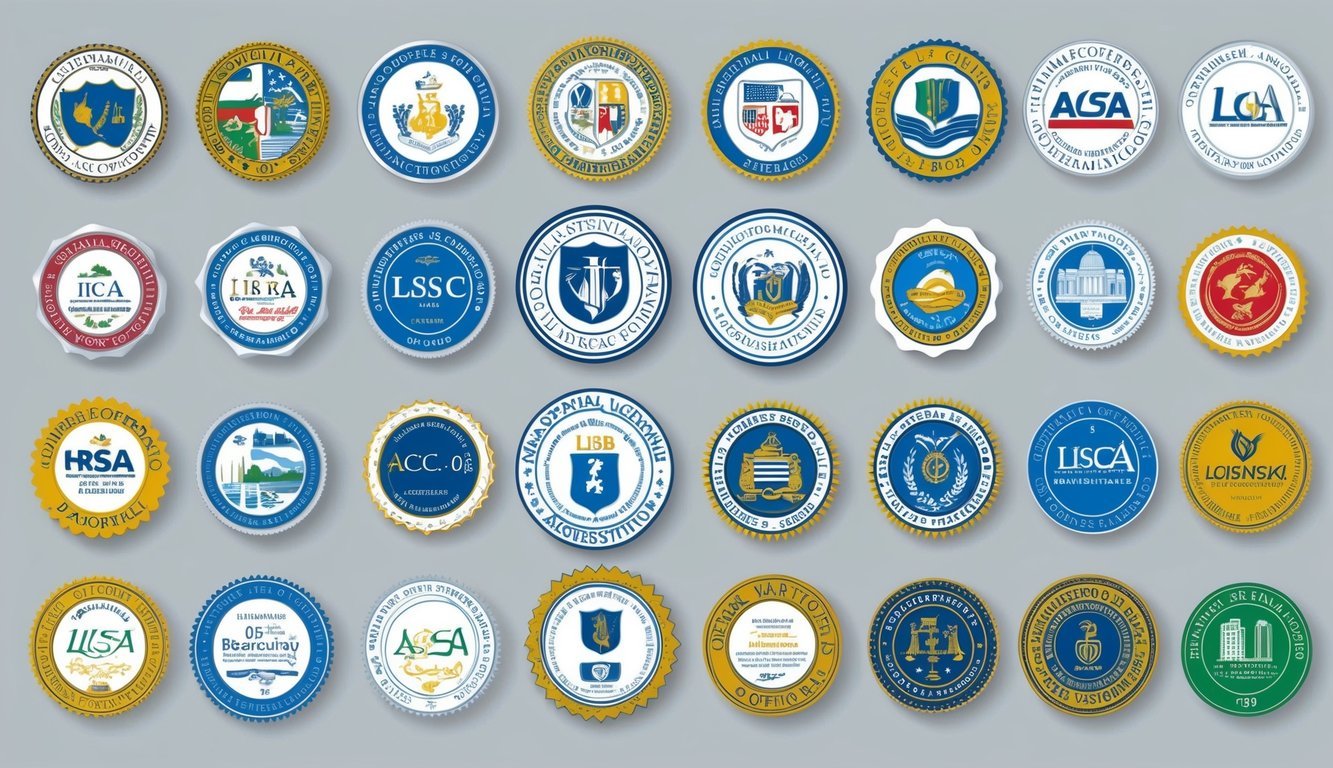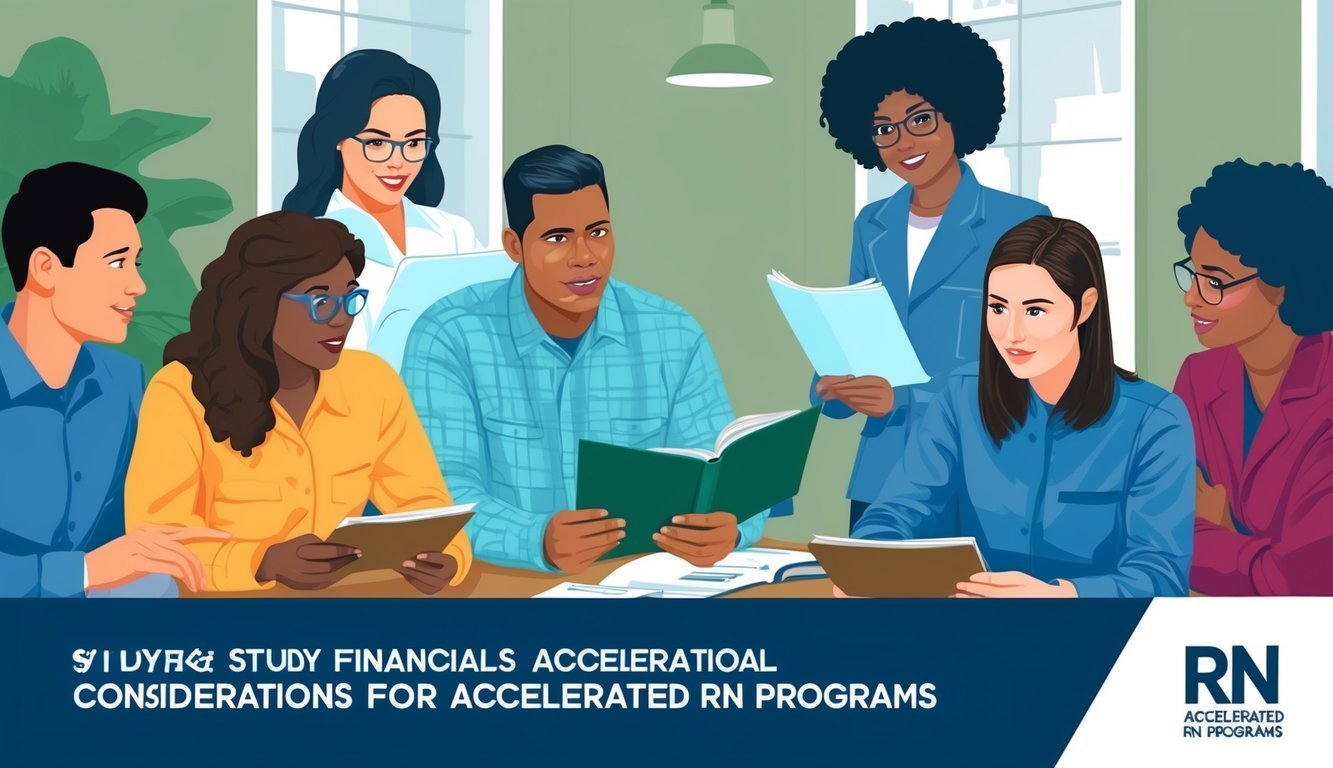Accelerated RN programs are for individuals who hold a bachelor’s degree in a non-nursing field and wish to enter the nursing profession quickly.
These programs can fast-track your journey to becoming a registered nurse in just 11 to 18 months, allowing you to leverage your previous education while gaining essential nursing skills.
This rapid transition is particularly appealing in today’s healthcare environment, where the demand for nurses continues to grow.
As you explore your options, you’ll find various accelerated nursing programs that cater to different educational backgrounds and professional aspirations.
From programs that lead to a Bachelor of Science in Nursing (BSN) to those offering advanced degrees like a Master of Science in Nursing (MSN), the possibilities are vast.
Resources like Nurse.org can guide you through the different paths available, helping you identify the right fit for your goals.
Accelerated RN programs not only enhance your career prospects but also allow you to make a meaningful impact in healthcare.
Accelerated programs often include comprehensive clinical training, ensuring that you are well-prepared for the challenges of nursing.
To compare top options, check out lists from sites such as Forbes and Nursing Process for insights on curriculum and admission requirements.
Understanding Accelerated RN Programs
Accelerated RN programs provide a streamlined path for those holding a non-nursing bachelor’s degree to transition into nursing.
These programs, including Accelerated Bachelor of Science in Nursing (ABSN), focus on intensive education to prepare you for licensure quickly.
Defining Accelerated BSN and ABSN
Accelerated Bachelor of Science in Nursing (ABSN) programs are designed for individuals who already possess a bachelor’s degree in another field.
These programs typically condense nursing education into a shorter timeframe, offering both classroom instruction and practical experience.
Most ABSN programs can be completed in 11 to 18 months.
You will engage in advanced coursework and clinical rotations to build essential skills.
The outcome is equivalent to a traditional BSN, allowing you to take the NCLEX-RN exam upon graduation.
The Structure of Accelerated Nursing Programs
Accelerated nursing programs often follow a rigorous curriculum that covers key nursing subjects, including:
- Pathophysiology
- Pharmacology
- Health Assessment
Courses are usually delivered in a fast-paced format, integrating lectures, hands-on labs, and clinical practice.
This structure aims to equip you with the knowledge and skills needed to excel in the field quickly.
Some programs also include online coursework for flexibility.
Here’s a typical timeline of an accelerated nursing program:
| Duration | Activities |
|---|---|
| 3-6 months | Classroom and lab instruction |
| 5-8 months | Clinical rotations |
| Final weeks | Review and NCLEX-RN preparation |
Admission Standards and Prerequisites
Admission standards for accelerated RN programs can be competitive.
Generally, you will need:
- A bachelor’s degree from an accredited institution.
- Completed prerequisites, which may include courses in biology, chemistry, and statistics.
Additionally, many programs require a minimum GPA, letters of recommendation, and a personal statement.
Some schools may also conduct interviews as part of the selection process.
Understanding the requirements and preparing your application effectively can enhance your chances of admission into these sought-after programs.
Key Components of Nursing Education
Understanding the essential elements of nursing education is crucial for your success in the field.
The blend of coursework, clinical experience, and skill development will prepare you for a rewarding career in nursing.
Important Nursing Coursework
Your nursing education includes a range of critical coursework designed to build foundational knowledge and skills.
Core subjects typically encompass anatomy, physiology, pharmacology, and health assessment.
These courses not only provide theoretical knowledge but also emphasize evidence-based practice.
You will learn to analyze clinical data and apply it to patient care.
Many programs incorporate specialized topics like pediatric nursing, geriatrics, and mental health.
This curriculum helps you develop a comprehensive understanding of diverse patient needs.
Clinical Rotations and Experience
Clinical rotations are a key component of your nursing education.
During these rotations, you gain hands-on experience in various healthcare settings.
Typically lasting several weeks, each rotation focuses on different specialties, including medical-surgical nursing, emergency care, and critical care.
This exposure is vital for understanding the realities of nursing practice.
You will work directly with patients under the supervision of experienced nurses and instructors.
This practical experience helps bridge the gap between theory and practice, solidifying your competencies in real-world situations.
Developing Critical Thinking and Communication
Effective nursing requires strong critical thinking and communication skills.
You will engage in activities that promote clinical reasoning, allowing you to assess situations, determine priorities, and make informed decisions.
Communication skills are equally important.
You’ll learn to document patient information accurately, convey information to healthcare teams, and engage with patients compassionately.
Role-playing and simulation exercises are often used to enhance these skills, preparing you to handle real-life scenarios.
Mastery of these components will significantly impact your effectiveness as a nurse.
Advancing Your Nursing Career
As you seek to elevate your nursing career, pursuing further education can significantly expand your opportunities.
This path may involve transitioning from a Bachelor of Science in Nursing (BSN) to a Master of Science in Nursing (MSN), specializing as a Nurse Practitioner (NP), or even pursuing a Doctorate in Nursing Practice (DNP).
From BSN to MSN
Transitioning from a BSN to an MSN is a common step for registered nurses who wish to enhance their qualifications.
This advanced degree opens doors to higher positions within healthcare facilities.
Key Benefits:
- Increased Earning Potential: MSN-educated nurses typically command higher salaries.
- Expanded Roles: With an MSN, you can take on leadership roles in nursing administration or education.
Most MSN programs can be completed in 1-2 years, depending on whether you attend full-time or part-time.
You might also consider programs that allow you to work while you study.
Specializing as a Nurse Practitioner
Becoming a Nurse Practitioner is a rewarding way to enhance your clinical skills while offering direct patient care.
With an MSN, you can specialize in areas such as family health, pediatrics, or geriatrics.
Advantages:
- Autonomy: NPs can diagnose and treat patients, often with less supervision than registered nurses.
- Diverse Opportunities: You may work in various settings, including hospitals, clinics, and private practices.
Specialization typically requires a certification exam and clinical experience in your chosen field.
Programs often encompass coursework in advanced pathophysiology, pharmacology, and health assessments.
Pursuing Doctorate Degrees in Nursing
For those aiming for top-tier positions in nursing, a Doctorate in Nursing Practice (DNP) provides advanced clinical training and leadership skills.
This degree is particularly suited for nurses who aspire to influence policies or innovate practices.
Key Features:
- Research Opportunities: DNP programs often involve complex projects that aim to improve patient care.
- Leadership Roles: Graduates frequently move into executive leadership positions or academia.
DNP programs usually take 3-4 years to complete, depending on prior education.
This degree can empower you to reshape healthcare practices and lead initiatives that improve patient outcomes.
Licensing and Accreditation

Understanding the requirements for licensing and accreditation is crucial for your journey in accelerated RN programs.
Proper preparation ensures you meet the necessary standards for becoming a registered nurse while attending a program that is recognized for its quality.
Preparing for the NCLEX-RN Exam
The NCLEX-RN exam is a pivotal step in obtaining your RN licensure.
This standardized test assesses your knowledge and skills required for safe and effective nursing practice.
Your program should adequately prepare you for the exam, ensuring a strong NCLEX pass rate.
Key Facts:
- The NCLEX-RN consists of multiple-choice questions.
- It tests critical thinking and decision-making skills.
To enhance your chances of passing, consider utilizing NCLEX review courses and practice tests.
Many accelerated programs incorporate NCLEX preparation into their curricula, providing you with essential resources.
The Importance of CCNE Accreditation
Accreditation plays a significant role in ensuring your nursing education meets high standards.
Programs accredited by the Commission on Collegiate Nursing Education (CCNE) are recognized for their commitment to quality education.
Benefits of CCNE Accreditation:
- Enhances the credibility of your degree.
- May be required for obtaining federal financial aid.
When selecting an accelerated RN program, verify its accreditation status.
Programs with CCNE accreditation signify a curriculum that adheres to rigorous quality standards, preparing you effectively for your nursing career.
For a comprehensive list of accredited programs, visit the CCNE website.
Financial Considerations and Support

Navigating the financial aspect of accelerated RN programs is crucial for prospective students.
Understanding the costs involved and exploring available financial aid options can help you make informed decisions about your education.
Calculating the Cost of Accelerated Programs
The total cost of accelerated RN programs can vary significantly depending on the institution and location.
Here’s a breakdown of common expenses you should consider:
| Expense | Estimated Cost |
|---|---|
| Tuition | $20,000 – $60,000 |
| Fees | $1,000 – $2,500 |
| Books and Supplies | $500 – $1,500 |
| Clinical Expenses | $500 – $3,000 |
| Living Expenses | Varies by location |
Tuition typically constitutes the largest portion of the costs.
It is essential to research each program’s specific tuition rates, as some may offer more affordable options.
Additionally, keep in mind living expenses, especially if attending a program in a city with a high cost of living.
Exploring Financial Aid and Scholarships
Many financial aid opportunities exist for students pursuing accelerated nursing programs.
You should consider the following options:
- Federal Student Aid: Complete the FAFSA to determine eligibility for loans and grants.
- State Aid Programs: Investigate funding available through your state’s education department.
- Institutional Scholarships: Many schools offer merit-based or needs-based scholarships. Check directly with your chosen institution.
- Private Scholarships: Look for nursing-specific scholarships from organizations such as the American Association of Colleges of Nursing.
Utilizing resources like Best Health Degrees can help you navigate the complexities of financial aid and increase your chances of receiving support.
It is crucial to explore all avenues to make your educational journey more affordable.
Online and Hybrid Program Options
Online and hybrid accelerated nursing programs provide flexibility and innovative approaches to education for aspiring RNs.
These formats allow you to balance your studies with personal and professional commitments, making the pursuit of your nursing degree more attainable.
Benefits of Online Accelerated BSN Programs
Online accelerated BSN programs offer several advantages that cater to diverse learning styles.
One key benefit is the flexibility to study at your own pace, allowing you to fit coursework around your schedule.
Many programs, such as those offered by Purdue Global and WGU, provide asynchronous courses.
This means you can access lectures and materials at any time.
Another significant aspect is the accessibility of resources.
Online programs often come with a wide range of digital libraries and online forums, fostering collaboration with peers and faculty.
Programs like the University of Texas at Arlington also provide robust support services to ensure you succeed in your studies.
Comparing Traditional and Online Learning Environments
Several factors come into play when comparing traditional classroom settings to online learning environments.
Traditional programs usually involve fixed schedules and in-person classes, which can limit your flexibility.
In contrast, online programs allow for a self-paced approach.
This enables you to manage coursework alongside other responsibilities.
Furthermore, online RN-to-BSN programs, such as those offered at GCU, often include interactive tools for learning.
You can engage in discussions, complete assignments, and take exams from home.
This modern approach helps develop digital literacy, which is increasingly important in today’s healthcare landscape.

